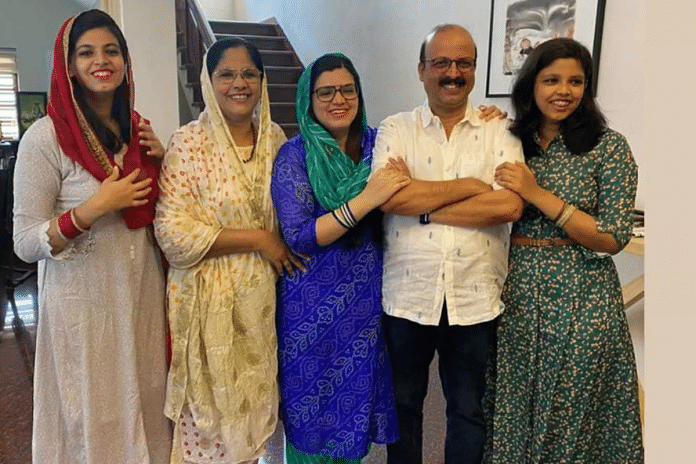On 8 March 2023, International Women’s Day, a Muslim couple in Kerala remarried under the Special Marriage Act 1954. Advocate and actor C Shukkur and his wife Sheena wanted to ensure that their three daughters are the sole inheritors of their father’s property, which would have otherwise gone to his brother. Although it did not receive coverage in mainstream prime time, the incident sparked intense debate on social media. And it holds great importance because it sheds light on the need for legal reforms in Muslim Personal Law that are aimed at achieving gender equality in inheritance laws.
The remarriage of the Kerala couple reveals how some Muslims are seeking ways to circumvent the limitations and the discriminatory nature of the Sharia law, which many are unable to break out of, fearing outrage from religious leaders and conservatives in the societies.
The couple’s conventional marriage, governed by the Muslim personal laws in India, allowed only two-thirds of the father’s property to be inherited by the daughters — the rest would go to his brother in the absence of a male heir. Through the secular marriage under the Special Marriage Act, the couple can now ensure that their daughters would be treated fairly.
The aftermath of this entire episode is what’s truly intriguing. Shukkur faced significant backlash from the Muslim clergy in Kerala. The Council of Fatwa and Research at Darul Huda Islamic University issued a fatwa against him, which reads: “True believers will not fall prey to such drama by those who use religion for personal gains. They will strongly resist such heinous moves that are meant to insult religious laws and drain believers’ morale.” A fatwa is essentially based on one scholar’s interpretation of Sharia, but the language used in this particular case implies that it is the direct word of God. The fatwa also states that “such thoughts are tragic results of the failure to understand the Islamic principles…Allah is the real owner of all wealth and property”.
Even in a supposedly democratic and secular country, Muslim women are the subjects of discrimination, where they do not have equal inheritance rights, access to resources, and equality before the law. And the collective backlash faced by Shukkur just proves that point.
Also read: Muslim Personal Law is an embarrassment. Adapt it to modern life—marriage, divorce, adoption
Sharia can evolve too
The Indian Muslim clergy keeps the masses under control by using absolutist language in fatwas. Some even take fatwas as essential Islamic principles. If an ordinary Muslim expresses any ideas that go against their interpretation or opinion, the clergy simply claims that they are working against Allah’s will. This puts ordinary Muslims at the mercy of the clergy.
Sharia is a man-made law based on various sources. That is why different Islamic countries have different laws, and the rules have changed over time. The fact that Saudi Arabia allowed women to drive ‘in keeping with Sharia’ in 2018 shows that these rules can be changed; it is ultimately up to the interpretation and opinions of the scholars and clergy in a country.
It is important to question why the Indian Muslim clergy doesn’t change Sharia to ensure gender equality rather than just suggesting alternative methods. When someone finds a way to let women enjoy equality, they are met with resistance and a fatwa is issued against them.
History is filled with such instances. In the early 20th century, Muslim women who sought to leave their abusive spouses weren’t allowed to do so. This was due to the prevailing belief among Indian Muslims, a majority of whom are Sunnis following the Hanafi school of jurisprudence, which mandated that a woman could not initiate divorce except in cases where her husband was impotent. As a result, the only option for many women was to renounce Islam. In response, some Islamic scholars devised a fatwa allowing Muslim women to seek divorce through khula.
Despite ways to protect women’s rights, some Islamic scholars with misogynistic beliefs have not shown a commitment to safeguarding their rights. In a secular democracy, with a progressive and robust Constitution, we shouldn’t fear the clergy. But sadly, they still wield power over the minds of significant sections of Indian Muslims.
Also read: Reform Muslim Personal Law now. It’s communal, sectarian, and anti-Islam
A Wahiduddin to a Zakir Naik
Islam is not a monolithic faith—it has different versions and practitioners. It is only Allah who decides whether we’re good or bad Muslims. A progressive United Arab Emirates, a reform-ushering Saudi Arabia, a secular Turkey, a moderatist Tunisia, and a pluralist Indonesia have as much claim on Islamic laws as per their interpretations. Just the way a hardliner terror group like the Taliban has in Afghanistan or a failed government in Pakistan, which has hijacked our beloved faith and made it a political weapon to be used against its opponents. If there is a Zakir Naik, there is also the Padma Vibhushan Maulana Wahiddudin Khan and Pakistan-born Javed Ahmad Ghamidi, who help us to contemporise Islam as per the demands of modern times.
So let us study the Indian Constitution and interpret our faith in accordance with its real message of equality and benefit from the very democracy where our radical clergy lives.
The State has a crucial role to play in ensuring equal and fair treatment of all citizens, regardless of their gender or religious affiliation. Indian Muslim women, like all other citizens, deserve the same rights and opportunities. It is high time for the clergy to acknowledge the changing times and work toward gender equality. The implementation of a Uniform Civil Code can ensure that.
Amana Begam Ansari is a columnist and TV news panelist. She runs a weekly YouTube show called ‘India This Week by Amana and Khalid’. She tweets @Amana_Ansari. Views are personal.
(Edited by Humra Laeeq)



